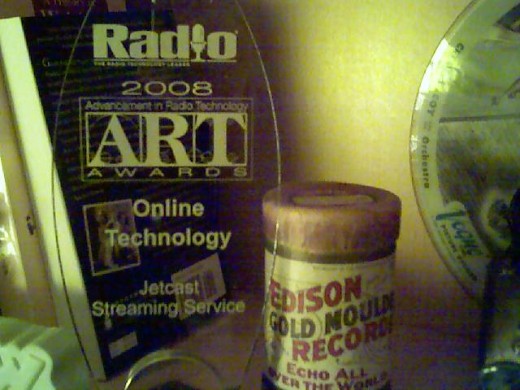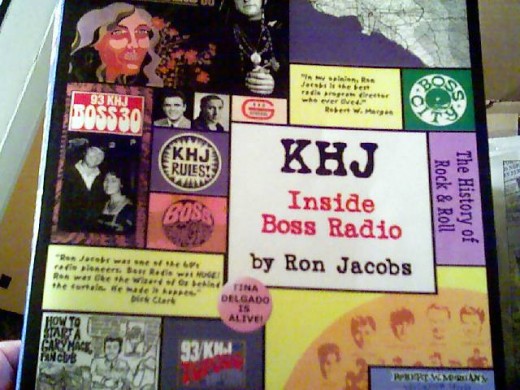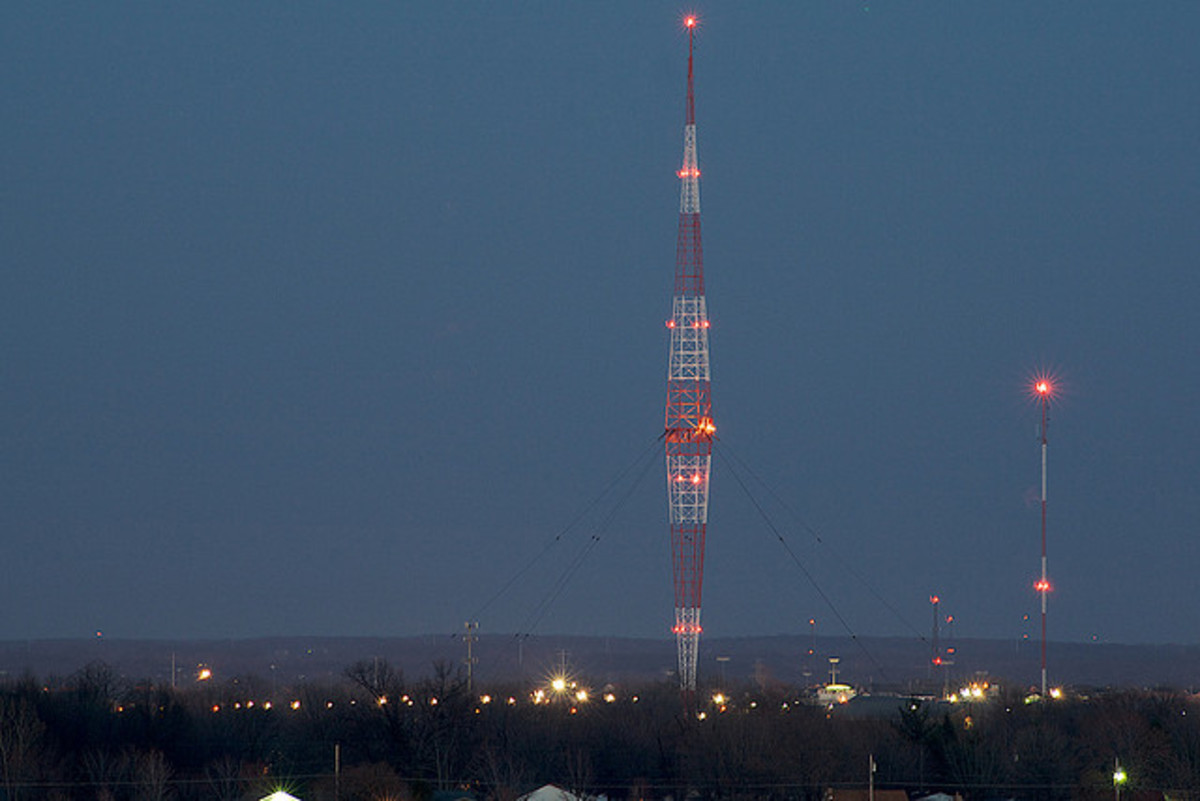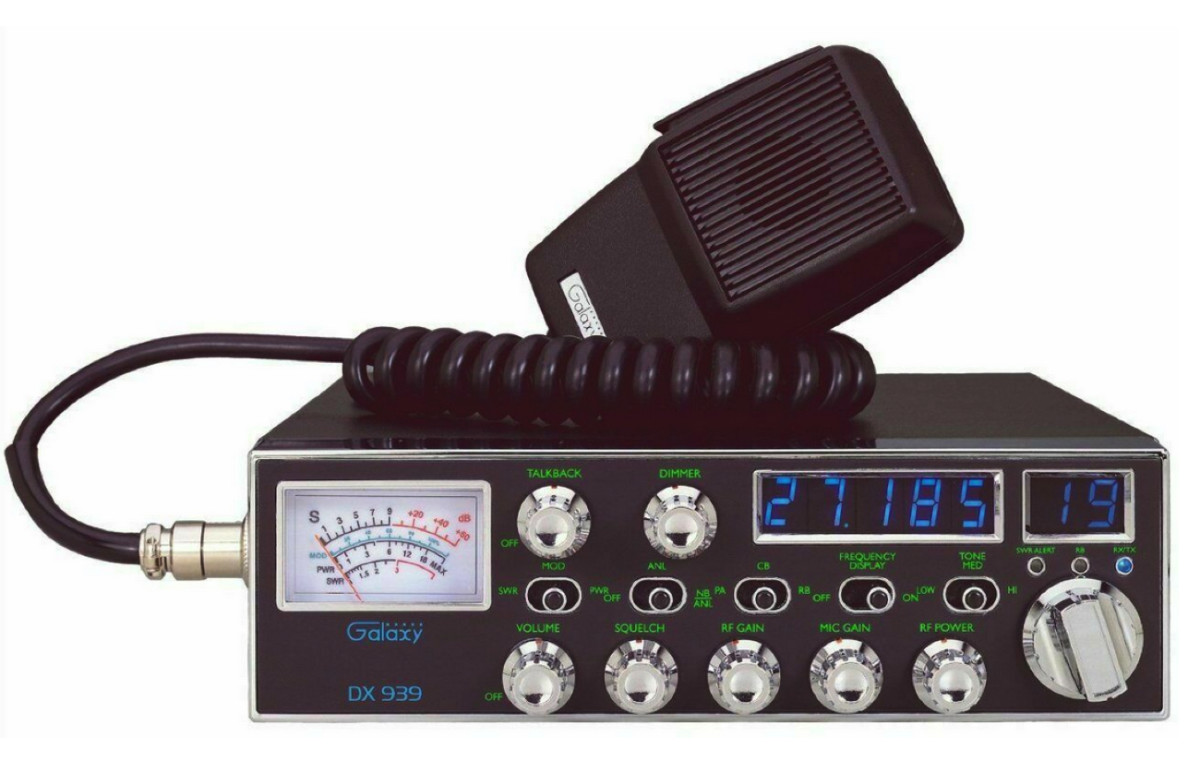Radio's Strange New Online Lingo
What a difference 100 years make! Radio streaming award, 2008, and Edison cylinder, 1908

Words they use in the world of streaming online radio
Let's look at the LINGO: the words of Internet streaming and their rough equivalents to radio terms.
ENCODER: a piece of software which “transmits” a radio station's audio over the Internet for listeners everywhere and anywhere.
PLAYER: software which plays an online radio station on a listener’s computer, like an online boombox.
WEB ADDRESS or URL: the exact online location where a web station lives on the net so listeners can find the stream. The station's URL is their online 'frequency' which they want listeners to remember so they can come back again.
CONTENT: any programming that occurs online. This turns terrestrial radio programmers into online content providers.
PLAYLIST: the online equivalent of a radio station's music log.
BIT RATE / BANDWIDTH: the speed at which data travels. These two terms are often used interchangeably when discussing audio quality.
METRICS: online listening numbers, but far more accurate. Instead of audience ratings estimates as used in terrestrial ratings, internet metrics are exact, so the stations know precisely how many people are listening and when they listened.
Non-streaming radios

Tell me about streaming radio, dad!
STREAMING: technology that makes Internet radio possible. Note that Internet radio, online radio and Webcasting all mean the same thing. The streaming process itself is audio or video over the Internet that plays on a listener's computer in real-time, as a continuous flow. The actual stream begins playing as soon as enough data is stored in the listener’s computer memory, or buffer.
BUFFER: a temporary place in a computer’s memory where information is stored until its ready to be played back. You’ve probably seen buffering in the middle of a stream that occurs when a station's streaming player has to wait for more information to “catch up”.
BANDWIDTH or BIT RATE: often called “the size of the pipe”. So, a bandwidth of 56K means 56 thousand bits every second, for good audio quality. Less bandwidthmeans lower audio quality, less bass and less stereo separation. Some stations have bandwidth over 100K which sounds amazing even from small laptop speakers.
GATEWAY AD or PRE-ROLL AD: These are the short commercials you see or hear before a stream begins to play, usually 10-15 seconds. When done, the radio station stream starts automatically.
SPOT REPLACEMENT: FM and AM stations that are considering re-broadcasting their programming over the Web look for ways to replace their on-air commercials with something else online. Today all station's need is a software package, which costs lots less than software plus hardware as in the "old days" 10 years ago. Online, some stations replace terrestrial spots with online spots, but also add extra “fillers” like promos or PSAs, while other stations are using those minutes to add genuine additional content like additional material from the morning show, showcasing new music, or short form features, all heard only by the station's online listeners.
CLIENT and SERVER: connected computers over a network. In streaming, a “client-side” computer is a listener’s computer, and a “server-side” computer is the radio station’s stream which serves the audio from the studios to that station's online listeners.
SKIN: graphics your listeners see on the station’s streaming player, like logo, banner ads, special preset buttons, or other artwork.
CODEC: a contraction for Compression and Decompression. A codec is where audio or video files are “encoded” to reduce file size AND to translate audio or video into a universal format so it can be streamed.
Story of KHJ radio and how they made millions 40 years before radio was streaming

Welcome to Acronym City
CDN: Content Delivery Network, a streaming company like Jetcast or any company that delivers station content (programming) over the Web.
ASCAP, BMI & ASCAP: ASCAP stands for the American Society of Composers, Authors, and Publishers....BMI is Broadcast Music Inc., and SESAC is the Society of European Stage Authors and Composers. These are the three largest music publishing companies which handle the vast majority of commercially-available music in the USA.
Any terrestrial or online radio station, even restaurants, stores, night clubs and bars which play any music licensed by ASCAP, BMI or SESAC must have an agreement with each publishing company before playing any songs from those publishers.
AFTRA: The American Federation of Television and Radio Artists, a national labor union representing performers in the media. A major reason stations don’t play their terrestrial spots online is because their AFTRA talent fees can go way up.
DRM: Digital Rights Management or “copy protection” for commercially-available CD’s & digitally downloaded files. For example: iTunes has their own proprietary DRM on the music they provide.
DMCA: Digital Millennium Copyright Act, legislation from 1998 making it a crime to copy or distribute other people’s intellectual property. DMCA legislation also controls access to copyrighted works like music.
CRB: Copyright Royalty Board, a government agency made up of retired judges who set the fees which record labels charge stations to play licensed music on the radio AND over the Internet. Meanwhile, there's the SOUND EXCHANGE, which is the private company that collects and distribute these fees on behalf of the CRB.
PPM: The Personal People Meter is being rolled out by Arbitron as the electronic successor to their paper diaries. If a station does not simulcast 100 percent of its terrestrial station on its internet stream, the station does not get combined credit for online listening. Regardless, most stations are choosing revenue over ratings, and splitting their streams from their on-air signal anyway.
These topics are still hot, active and changing in the growing world of online Internet radio, so this scenario is subject to change as new ideas and new technologies emerge.








